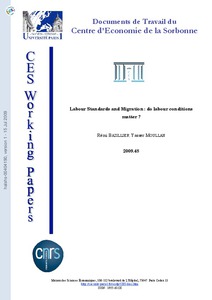Labour standards and migration : do labour conditions matter?
"We study in this paper the interactions between migration rates and the level of labour standards. We use an augmented version of the Grogger and Hanson (2008) model, adding the level of working conditions into the specification. Our hypothesis is that the differential of working conditions ma...
| Main Authors: | , |
|---|---|
| Institution: | ETUI-European Trade Union Institute |
| Format: | TEXT |
| Language: | English |
| Published: |
Paris
2009
Université Paris I |
| Subjects: | |
| Online Access: | https://www.labourline.org/KENTIKA-19187403124919056859-Labour-standards-and-migration.htm |
| _version_ | 1771659902653038594 |
|---|---|
| author | Bazillier, Rémi Moullan, Yasser |
| author_facet | Bazillier, Rémi Moullan, Yasser |
| collection | Library items |
| description | "We study in this paper the interactions between migration rates and the level of labour standards. We use an augmented version of the Grogger and Hanson (2008) model, adding the level of working conditions into the specification. Our hypothesis is that the differential of working conditions may be a complementary determinant of migration. In a first time, we test the influence of labour standards in countries of origin using a database on emigration rates built by Defoort (2006) for the period 1975-1995. For labour standards, we built an original index with a temporal dimension. We find that labour standards in the source countries does not have a significant impact on the probability of moving abroad. In a second time, we use a bilateral migration database built by Marfouk and Docquier (2004) in order to test the influence of labour standards in destination countries. If labour standards in the source countries do not have a significant impact on migration flows, level of labour conditions in destination countries have multiple effects on bilateral migration flows. Social protection or protection of collective relations have a positive impact on migration, while job and employment protection laws have the opposite effect. We also find that high-skilled workers are much more sensitive to social security benefits while low skilled workers are more attracted by a protective job and employment legislation. " |
| format | TEXT |
| geographic | Australia Canada France Germany United Kingdom USA |
| id | 19187403124919056859_10f43a5981cf4642b8abb9ccf92fd692 |
| institution | ETUI-European Trade Union Institute |
| is_hierarchy_id | 19187403124919056859_10f43a5981cf4642b8abb9ccf92fd692 |
| is_hierarchy_title | Labour standards and migration : do labour conditions matter? |
| language | English |
| physical | 40 p. Digital |
| publishDate | 2009 |
| publisher | Paris Université Paris I |
| spellingShingle | Bazillier, Rémi Moullan, Yasser brain drain labour standard migration statistics working conditions Labour standards and migration : do labour conditions matter? |
| thumbnail | https://www.labourline.org/Image_prev.jpg?Archive=116202493448 |
| title | Labour standards and migration : do labour conditions matter? |
| topic | brain drain labour standard migration statistics working conditions |
| url | https://www.labourline.org/KENTIKA-19187403124919056859-Labour-standards-and-migration.htm |

